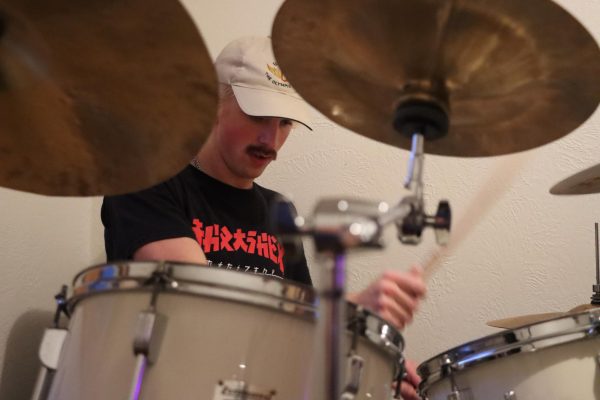Kendrick Lamar releases unmastered album
March 30, 2016
Few artists could release a collection of unmastered demo songs and have it become the top-selling album in the nation. Even fewer rappers could in an era where record sales are becoming less and less relevant by the day.
But recent Grammy winner Kendrick Lamar can, as he released an eight-track cut of untitled and unmastered songs as an album without prior announcement on March 4, fittingly titled “untitled, unmastered.” The “album” sold 142,000 copies, 178,000 equivalent sales (a figure combining album sales with album streams), to top the Billboard charts.
While none of the songs had previously been released, Kendrick had performed three of them during three separate television events-once as the final musical guest on The Colbert Report, once on The Tonight Show Starring Jimmy Fallon and once at the 2016 Grammy Awards, where he took home the best rap album for “To Pimp A Butterfly.”
The untitled songs are identified by the dates they were recorded, and the first track was recorded on August 18, 2014. After a brief and creepy monologue from singer Bilal, Kendrick comes from nowhere to deliver a hard-hitting verse that drips religious references, including multiple nods to hearing the trumpets blaring, citing the upcoming judgement day.
The second track is probably the easiest song to just listen to without focusing too much. Kendrick’s lyricism has so much depth and complexity that the listener must be paying their utmost attention to understand and fully appreciate the music.
In this track, while attention is still required, the listener can drift in and out and still enjoy the smooth beat that Kendrick navigates with multiple flows, voices and cadences, while maintaining the same subject matter, connecting the growing problems he has at home with the growing problems of the world, both socially and economically. He also references the apocalypse again, rapping, “Got God on the phone, he said it won’t be long.”
Untitled 03 is possibly the most socially conscious and aware of the project, which for Kendrick, is saying a lot. He asks each ethnicity what he needs a piece of to make himself whole. While the Asian says a piece/peace of mind, the Indian says a piece of land. A fellow black man told Kendrick he needed a piece of p***y, a woman’s touch.
Once cornrow Kenny gets to the white man, he has quite the message built up. What did the white man say? “A piece of mine’s, that’s what the white man wanted when I rhyme, telling me he selling me for $10.99. If I go platinum from rappin’, I do the company fine,” he starts with, before continuing to expose the white men in suits who exploit Kendrick and his people for profit. He ends the song with a powerful chant of “Tell ‘em we don’t die, we multiply.”
The phenomenal piece is followed by an abstract interlude and features the help of SZA, before moving on to the song that Kendrick debuted at the Grammys.
After a beautiful hook from Anna Wise, Kendrick delivers a dark and twisted verse that paints the picture of him speeding down the highway with ammunition and the Bible in his trunk.
Cee Lo Green teamed up with Kendrick for the sixth song, which was a bit of a snoozer. It sounded like something from the era of jazz and swing and was released about 75 years too late.
The seventh song, widely regarded as the best on the project, is perhaps the most braggadocios Kendrick since he shook up the entire genre with his now-legendary verse on “Control.” According to Kendrick, love, drugs, fame, chains, juice, your crew or your hate cannot get you as high as his music can. And rather than hate, Kendrick urges others to shut up and make some money.
The project is finished off with Kendrick’s song from his performance with Fallon. In it, he laments the financial struggles that the black man faces in today’s world.
Just like “To Pimp A Butterfly,” a majority of “untitled, unmastered” was not meant for me. By that, I mean that the music Kendrick has been making recently is for the black community. It is powerful music that uplifts the spirits of many in the black community, which as a white person, I will never be able to totally familiarize myself with.
The title itself is representative of that. While obviously a nod to the songs being unmastered and untitled, “untitled, unmastered,” is a powerful way for Kendrick to describe himself. In a time of racial injustice, the white man cannot put a title or label on him, nor can they control him.
While I cannot fully comprehend and understand the music, I certainly can appreciate it. I can appreciate Kendrick and respect him for the message and power behind his words, and for the responsibility in his community that he shoulders.
This is certainly not some music to just put on and enjoy in the background. To fully embrace Kendrick and “untitled, unmastered,” one must fully diverge their minds into the music.
In the current times that could be preluding anarchy and revolution in the black community, nobody does a better job being a voice for their people than Kendrick.










